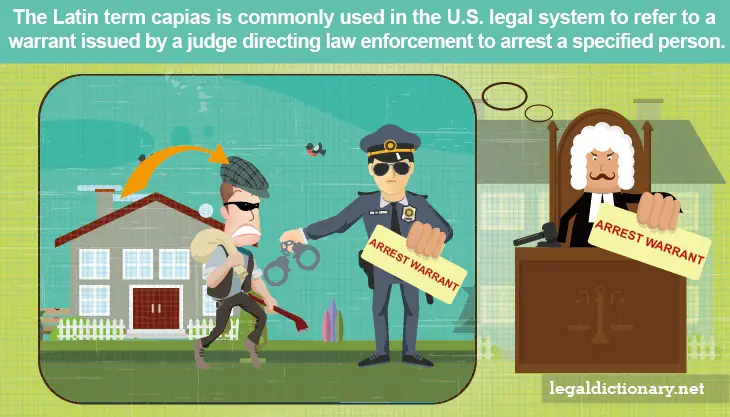Capias
The Latin term capias literally means “you are to seize,” or “you should seize,” and is commonly used in the U.S. legal system to refer to a warrant issued by a judge directing law enforcement to arrest a specified person. Capias warrants are most commonly issued when a criminal defendant fails to appear in court for a scheduled hearing. By having police officers take the individual into custody, a judge can guarantee he appears in court. To explore this concept, consider the following capias definition.
Definition of Capias
- noun. An arrest warrant.
- noun. A writ of arrest issued by a court of law.
Origin 1400-1450 Late Middle English < from Latin
Procedures for Issuance of a Capias Warrant
Capias warrants, or arrest warrants, may be issued in a wide variety of situations, though there are certain procedures for issuance of a capias warrant required by law. These types of warrant are commonly referred to as “bench warrants,” because they are usually issued by judges when a person did not show up to court. This may be in a criminal matter, or in a civil matter in which the judge had previously ordered the individual to appear at a specified time, and failing to appear amounts to contempt of court.
While this may vary slightly by jurisdiction, a valid arrest warrant must include the following information:
- Identity of person to be arrested
- The offense charged, or reason for the arrest
- A command that the person be arrested and brought without delay before the court
- Signature of a judge
Examples of Capias Warrants
The court issues orders for people to appear, or to do other things, in a variety of circumstances. Such orders are often referred to as “writs,” and require the person named on the warrant to be brought before the court for some specified purpose. Following are examples of capias warrants more commonly used in the U.S.
- Capias Pro Fine – issued when a defendant fails to satisfy a court judgment. A capias pro fine commands law enforcement to arrest the defendant and either bring him before the court, or incarcerate him immediately until he pays the judgement.
- Capias Ad Audiendum Judicium – issued to bring a defendant convicted of a misdemeanor, who has failed to appear at his previous hearings.
For example:
Ron, who crashed into a parked car when he was driving through a parking lot under the influence of alcohol, was ordered in civil court to pay the owner of the car $8,500 within 60 days. Ron, who makes a decent living, spends a lot of his money at the bar, and at the local racetrack.
After the 60-day period, when the car owner had not received payment, he applies to the court to enforce the judgment. The judge may issue a capias warrant to have Ron arrested and brought before the court. In some circumstances, the warrant may specify that Ron is to be held in jail until he pays the judgment, rather than making a court appearance.
Capias Warrant in an Unemployment Fraud Case
In 2012, a Casper, Wyoming man signed up to receive unemployment benefits. The man, Carlos Pina, had claimed on his reporting forms that he was not working during the period of March through July, though an audit revealed that he had been working. Pina didn’t respond to the many attempts by the Wyoming Division of Unemployment to contact him, so his case was turned over to the department’s investigative division.
When shown copies of previously issued unemployment checks with his signature on them, Pina claimed the signature wasn’t his, but that it might have been his ex-wife. He also denied owning a state ID-only card, and the ID number written on the checks did not match his driver’s license. Through further investigation, it was discovered that the number on the checks did indeed match Pina’s state-issued ID card, which had been issued after his driver’s license had been revoked for DUIs.
Pina was taken into custody, then released on $3,000 bond. When he was scheduled to appear in court to change a plea, he didn’t show up. The judge issued a capias warrant for Pina’s arrest, leaving police to search for the man to return him to court.
Related Legal Terms and Issues
- Civil Lawsuit – A lawsuit brought about in court when one person claims to have suffered a loss due to the actions of another person.
- Contempt of Court – A willful act of disobedience to an order of the court; deliberately being rude or disrespectful to the judge or the court.
- Defendant – A party against whom a lawsuit has been filed in civil court, or who has been accused of, or charged with, a crime or offense.
- District Attorney – An attorney employed by a county or other district, charged with prosecution of criminal charges on behalf of the government. Also: Prosecutor.
- Jurisdiction – The legal authority to hear legal cases and make judgments; the geographical region of authority to enforce justice.
